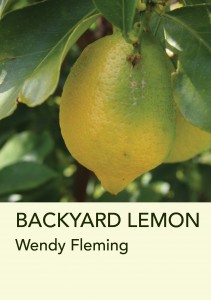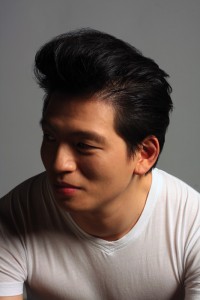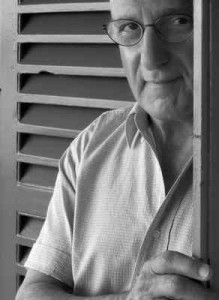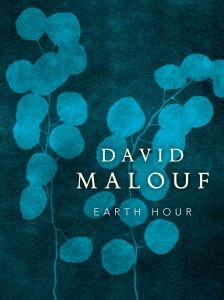 Roanna Gonsalves is an Indian Australian writer. She is currently a PhD candidate at the University of New South Wales, Australia, researching how writers are created in the contemporary Indian literary field. She is the founder-moderator of the South Asian Australian Writing Network.
Roanna Gonsalves is an Indian Australian writer. She is currently a PhD candidate at the University of New South Wales, Australia, researching how writers are created in the contemporary Indian literary field. She is the founder-moderator of the South Asian Australian Writing Network.
One November night in Sydney, Roslyn adjusted the dimmer on her new Ikea floor lamp. Her living room was full of the Bombay gang. They had gathered to meet John Greenaway. He was Paul’s client, and the Director of the Australia India Festival of Culture, Social Harmony and Business. Roslyn had been adjusting that dimmer every time she walked past the lamp, going brighter, going darker, until she was satisfied that the room looked cosy yet sophisticated, much like the cover of the Ikea catalogue itself.
Suddenly, Sushma clapped her hands and said, “Okay everyone, Lynette has written a skit. She’s going to read it out now.”
Roslyn, by then, was at the breakfast bar, arranging her beef roulade on brand new Belgian crystal. She had been saving up her last packet of Goan chorizo just for tonight’s beef roulade. She would welcome John with a plate full of this offering in her left hand. Her right hand she would leave free to place on his back and guide him in. When Sushma made this totally unexpected announcement, she said, “Er, Sushma, we’re expecting John any minute now.”
Paul said “He’ll be late, he just messaged.”
Sushma looked at Roslyn for permission to continue. Roslyn shrugged her shoulders.
Most of the Bombay gang were still on student visas, still drinking out of second hand glasses from Vinnies, and eating off melamine plates while waiting and waiting for their applications for Permanent Residency to be processed. Lynette was one of them. She was Paul’s neighbour from Bombay, now enrolled in an MBA at a university in Sydney. Paul and Roslyn were the lucky ones. They came to Sydney not as students, but on a secondment from Paul’s multinational accounting firm. It was Roslyn who convinced Paul that they should stay on, become Australian citizens, because it thrilled her to be anonymous yet striking in the undulating uniformity of Sydney’s affluent lower North Shore.
In the background Elvis was booming through Paul’s new Bose speakers, You Ain’t Nothin’ But A Hound Dog. Lisbert, an accounting student, had just stood up, stretched out his arms towards Lynette, about to ask her to jive. But when he heard Sushma’s announcement he retracted his arms and sat down again.
“Oh,” said Paul, turning around. “A skit? You mean like a play? Didn’t know we had a Salman Rushdie in Sydney.”
“Salman Rushdie doesn’t write plays,” said Sanjay, another accounting student. “Novels he writes.”
“Same thing yaar, for any kind of writing-viting you have to have a good command of the language”, said Paul.
“I always say, if you have the Queen’s English you have everything”, said Roslyn.
“If you can write novels, you can write plays,” said Paul. “Salman Rushdie, if he tries to write plays, again he will make millions, again he will get a fatwa, again he will marry a model…”
“But Paullie, do you really think novels are the same as skits?”
“C’mon, let’s hear it,” said Sushma. “She’s written it, let’s hear it!”
Lynette opened the embroidered cloth folder and lifted a few handwritten sheets of paper into the white light.
Lisbert turned down the volume and turned on the yellow house lights. Lynette nodded ever so slightly, without taking her eyes off her script. She began to read. “It was a dark November night …”
Suddenly Roslyn stood up.
Lynette stopped reading.
Roslyn said, “One sec Lynette, I’ll draw the curtains.”
When she was done she sat down again and flicked her hand indicating that Lynette could continue. So Lynette started again.
This was the first time she had ever read her writing aloud to anyone, let alone to a whole group of people. She faltered at the start, her tongue tripping on the opening lines of dialogue. But soon, she took the silence in the room for interest, and was encouraged.
The story was an amalgamation of many stories in the newspapers that year. A girl comes to Sydney on a student visa, attends a private college, and studies hairdressing. Like many others before her she has been promised Permanent Residency in Australia, or PR, by her migration agent, by her private college, and by the man who stamped her visa. The fees are more than what was advertised in the brochure. When she complains to the Student Welfare Officer, he is very sympathetic, invites her to his house, and after a glass of Reisling, begins to kiss her. She initially resists like the good woman of Hindi films and convent schools. But he is cute and keen and accurate. She succumbs to the callings of her own body and his. However, in the throes of passion he says, “Call me Mountbatten”. Then, eyes closed, he breathlessly proceeds to call her a stinking curry muncher cunt. She is stunned. She runs away immediately and decides to lodge a complaint of sexual assault and racism through the local courts. He contests the allegations and, playing on the latest cricket match fixing scandals between India and Australia, he counter alleges that she was attempting to buy him with sex. The story climaxes with a dramatic courtroom scene, and ends with the girl being deported and the Student Services Officer going scot-free.
Lynette finished reading.
There were brand new crystal glasses on the coffee table in front of Lynette. The light from the floor lamp made them glow like compliments.
She asked, “So? Was it ok?”
Still, there was silence.
Then Roslyn said, “Oh my! That was, that was…. God! You poor thing, why didn’t you tell us you were going through all this!”
Lynette had imagined all kinds of feedback. For weeks she had practiced witty comebacks to questions about the dialogue, the sex scene in the story, the decision to reflect India through the broken mirrors of diasporic memory. But the assumption that the skit was autobiographical took her by surprise.
“No no, I didn’t go through any of this…”
Again, a silence full of pity and a collective Catholic ache to be helpful.
“Really! Nothing like this happened to me. Seriously.”
“You mean to say you made it all up?”
It’s…what’s it called…fiction or something?”
“Yes,” she said.
“So it’s not true then.” Roslyn got up and pulled the curtains back.
“No.”
Sushma’s eyes were red from the tears she was freely shedding. “Such a beautiful story!. You are so brave, I mean, the girl is so brave and … so….so…. Poor thing.”
Lisbert said, “Forget your MBA, you should take up writing. See J.K. Rowling, she’s rolling in cash. What will your MBA give you? Nothing compared to that!”
Paul, who had not even taken one sip of his whisky during the entire reading now drained his glass and said, “Lynette, Lynette! Who would have thought the little two year old girl I saw running around in her panties in Barfiwalla Building in Byculla would one day write plays like Salman Rushdie!”
Sanjay inhaled sharply, but Paul ignored him and continued, “Superb! So proud of you, my girl! Didn’t know that students who come here suffer like that. So terrible that she was deported.”
Sushma said, “Shit yaar! What a heart-wrenching ending! Forget Hollywood! Forget Bollywood! This is heaps better! You can start an Aussiewood all by yourself!”
Sanjay reached for the beef roulade and put a piece in his mouth. The only other time he had heard of beef and pork together was in relation to the bullets, smeared with the fat of the cow and the pig, that sowed the seeds for 1857, the First War of Indian Independence.
“Nice bullets” he said, and gobbled up a second piece.
“Beef Roulade. High time you Hindu buggers learnt the proper names for Catholic food”, Roslyn said.
“Sorry. I was just…”
Sushma interrupted Sanjay. “It was so real what you wrote! So typical of men in power, they always abuse it, especially when there is a succulent and exotic thing in front of them.”
Sanjay said, “Lynette, give me your autograph now only yaar, when you become famous you’ll forget all of us.”
Sushma said, “This John Greenaway who is coming, read it to him, maybe he will…he will…requisition it, put an encumbrance on it, or whatever it is they do with plays, you know what I mean.”
Lynette said, “If John Greenaway likes it, then who knows, I’m ready to quit the MBA and write full time.”
She looked at Paul and Roslyn. “It’s ok if I read it out to him, isn’t it?”
Paul poured himself another stiff drink. He was drinking scotch because he couldn’t find the feni, made by his uncle in Saligao, Goa. The minute you opened the bottle the aroma spread across the room, it was that good, the feni. He took a sip of his scotch and said, “Of course. Read it, read it, he’ll be very impressed. A female Salman Rushdie in Sydney, he’ll be impressed. And my neighbor after all. Tell him you got it all from me!”
Sanjay inhaled sharply again, but Roslyn said, “You know me, I don’t beat around the bushes. The play is great, you are a great writer. But when you talk about the Student Welfare Officer, he’s Australian?”
“Yes”, said Lynette.
“A proper Australian?”
“Yes”, said Lynette.
“White?”, asked Roslyn.
“Proper Australians are blacker than us”, said Sushma.
“White, white”, said Lynette.
“Like John Greenaway,” said Roslyn. “We don’t want to offend John Greenaway. He’s also Australian. He’s also in a position of power. He should be here anytime now. What if he thinks you had him in mind?”
“I didn’t…”
Paul added, “Poor fellow just got divorced.”
“Wife left him,” Roslyn interrupted, “Don’t want to offend him.”
“That’s true,” Lisbert said. “Don’t want John Greenaway to get the wrong impression about you”.
Lynette looked at him, pushed her hair behind her ears.
“Yes, better leave him alone”, Paul said, “Recently divorced…”
“Wife left him,” Roslyn interrupted again.
Lynette began to look through her manuscript.
“What if I make the Student Services Officer half white and half Aboriginal?”
“You mean like that newsreader on TV?” Sushma said.
“That way John Greenaway won’t be offended,” said Lynette.
“What if John Greenaway has Aboriginal blood too?” Lisbert asked.
“Arre baba, Sanjay said, “See, if Aboriginal people can be white, then white people can be aboriginal, right or not what I am saying?” All Whites in this country have Aboriginal blood in them”.
“You mean on them”, Sushma said.
“In them”, Roslyn corrected her. “Queen’s English.”
Sushma stayed silent. This was Roslyn’s house.
“You can’t make an Aboriginal character a perpetrator, even if he is only half Aboriginal,” said Sanjay
“Who says?” said Lisbert.
“It’s just not done!”, Sushma said.
“It’s all politics…” said Lisbert.
“Arre! Forget politics-sholitics” said Sushma, turning to Lynette, “First the blacks will kill you. If you are still not dead then those Greens will eat you alive.”
“Greens? But they’re vegetarian.” said Lisbert.
“Doesn’t matter. For her they will make an exception.”
There was a pause. Then Rosyln said,
“You’ll just have to take out the Student Services Officer”.
Sanjay reached for the beef roulade and put a piece in his mouth.
Lynette said, “Take out the Student Services Officer? But…”
After he had swallowed the beef roulade, Sanjay said, “Lynette, one small thing, but I think I should mention it, don’t want you to get into trouble.”
Lynette turned towards him.
“In the court room scene, you actually mock the judge! That’s a bit risky, don’t you think?”
“Very risky”, Roslyn said.
“I mean, you’re a superb writer”, Sanjay continued. “What emotions you have captured! But why risk it? So many years, so much money you have spent here, lakhs and lakhs of rupees. Why risk your PR application being rejected?”
“That’s true,” Lisbert said. “You really deserve to get PR Lynette.”
“You have to make the judge look good,” Paul said.
“Just take out the judge,” Roslyn said.
“Take out the judge?”
“As long as it’s grammatically correct. Queen’s English.”
“But the judge is…”
“You don’t need to have all that drama in the court room. Just make her get a letter or something at the end, giving the details of the verdict. You can do the letter in capitals so we know it is different from the other parts of the story. Times New Roman.”
“But you can’t see Times New Roman on stage.”
“The point is this. It has to be the Queen’s English.”
Paul opened the showcase to look for the feni but he couldn’t see it. So he poured himself another scotch.
“Do you know John Greenaway’s wife?” he asked.
“Ex-wife,” Roslyn said.
“John Greenaway’s ex-wife. You know she’s some big shot Professor, femin…femin…
“Feminist”, said Roslyn.
“Feminist”, said Paul. “She was going on marches-farches when she was young. Sharlene Connor I think her name is.”
“Oh! Sharlene Connor! I know her. She’s at our uni, right Sushma?” asked Lynette, “In the Arts Faculty, Humanities Faculty, whatever it’s called.”
“She’s at your uni? You purposely made the victim into a man-hater? Because of John Greenaway’s wife?” Paul asked.
“Ex-wife,” Roslyn said.
“She comes across as a man-hater?”
“No no”, said Lisbert.
“Yes, yes, very hateful”, Paul said.
“I didn’t know she was his wife!”
“But if John Greenaway hears the victim’s speech and he finds out which uni you are in, he will think that you are mocking him, that WE are mocking him!” said Paul.
Roslyn said, “You know I like you Lynette. Don’t get me wrong. But John Greenaway is coming home to relax, get some comfort after his wife left him, eat some homemade vindaloo, not just curry from a Patak’s bottle or something.”
“I’m so sorry I…”
“He’s a great lover of Indian culture. He should be here anytime now. He’s going to support our Indian Catholic Association of Sydney. Now you will go home and go to sleep. Life will go on for you. But what about us? We are the ones who will be blamed. After all he is coming to our house. Your play mocks him in our house. He will think we are taking the mickey out from him. Even the Queen’s English cannot hide this fact.”
“I’m so sorry, I didn’t mean…”
“No need to say sorry, it’s not like you’ve sinned or something.
“Thank you for…”
“I know you didn’t do it on purpose.”
“I didn’t.”
“And I know very well about metaphors and metonymy.”
“She is first rate in Grammar and Composition”, said Paul.
He’s Paul’s client, don’t forget that. You know what Gandhiji said. Customer is God. So I say John Greenaway is God.”
He’s divorced, watch who you’re calling God” Paul said.
“Wife left him”, she reminded him, “not like it was his fault. You know what white women are like.”
Sanjay reached out for the beef roulade again and put another piece in his mouth. Just then a cock crowed. It was Paul’s phone. Roslyn reached across to the mantelpiece, picked up her Japanese hand fan bought on a holiday in Boston last year, and began to fan herself quickly.
“Same as Indian women” Paul said as he put his phone on silent without even looking at it. Then he cleared his throat.
“If you want to be Salman Rushdie you should be prepared for a fatwa,” he said.
Lynette cracked her knuckles.
“But why a fatwa when you’ve spent so much, waited so long, worked so hard for permanent residency?” Lisbert said.
“A fatwa is not a good idea on a student visa,” said Sushma.
“Tear it up,” Lisbert whispered in her ear, holding his face close to hers for a moment longer than appropriate.
She turned her face to him and for the first time, looked into his eyes.
“I’m tearing it up”, she said.
She didn’t recoil when his hand squeezed hers.
Then she said loudly, “Don’t say anything to John Greenaway when he comes. About my skit.”
Sanjay found a napkin and wiped his oily hands clean.
A breeze of absolution blew across the room and recalibrated it.
Sushma hugged her.
Roslyn looked at the crystal plate and saw that there was only one piece of beef roulade left on it. She put the plate away in the oven.
Lisbert went across to the CD player and turned up the volume. By then the CD had moved on to Love Me Tender. He held out his hand to Lynette. She took it. They danced in front of everyone, not quite cheek to cheek, but there would be time for that.
Paul spotted the feni at the back of the showcase. He brought it out carefully, poured a neat peg for Roslyn and presented it to her.
But she had already rewarded herself with Riesling. She turned off the houselights and sat in her favourite armchair, watching the pirouette of the Bombay gang. Crossing her legs, she held her brand new crystal goblet in her left hand. Her right hand she dangled over the armrest. She brought the wine to her lips. She breathed in the room unfurled before her. It was now enveloped only in white Ikea light.
 Autumn Royal is a poet and PhD candidate at Deakin University. Autumn’s writing has appeared in publications such as Antipodes, Cordite, Rabbit, and Verity La.
Autumn Royal is a poet and PhD candidate at Deakin University. Autumn’s writing has appeared in publications such as Antipodes, Cordite, Rabbit, and Verity La.





